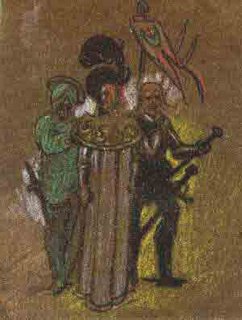
In the Oct./Nov Gilbert Magazine, there is an article by GK Chesterton from 1929 called "The Inefficiency of Science". It seems to fit in with the thoughts I've been having about WHY homeschooling can work (depending on whose standards of "work" you are using, of course, but isn't that the very crux of the issue?)
He writes that science is a succession of hypotheses:
"What is the matter with the scientific hypothesis, as a help about marriage or education or hygiene, is that even when it has really proved something, we can never tell what the things itself will ultimately prove. Therefore if we act upon it at any given moment, in relation to any given problem, we are always acting on an unfinished process of thought, which, even if it is never falsified in theory, will almost certainly be falsified in fact."
The example he gives is of Professor A, who declaims that since Noses are repositories of 90% of the body's germs, nose removal surgery for everyone will forestall most of the illnesses to which we are subject. Once all the noses are removed, PRofessor B shows that germs have multiplied all over the human body. Professor C then discovers that indeed, noses are repositories for germs, and that that is their purpose, to provide a kind of barrier or airlock to keep germs from the rest of the body. None of the professors have contradicted each others' findings, but the final discovery contradicts the implications acted upon by the first discovery.
He goes on:
"It would be easy to illustrate the same thing from education; for our schools are swept nowadays with wave after wave of scientific speculation: by fad after fad and fashion after fashion. They are generally notions quite new even in the scientific world; and each one of them will probably be shown by science to be the same sort of double-edged weapon. I am quite unable to imagine why we should say in such cases that we are educating the children. I could understand it if we said we were educating the educators, by giving them a crowd of children on whom to experiment. It would be comprehensible if considered as a sort of more or less humane vivisection. But the scalpel of the vivisectionist will again be found to be a weapon that cuts both ways. If the scientific educationist is really ready to learn from his own experiences in educating the children, the thing he will probably learn, under these conditions, is that his way of educating them has been entirely wrong. For these notions are, in their very nature, hypotheses to be tested and not truths to be taught."The picture is a sketch done by GKC

No comments:
Post a Comment